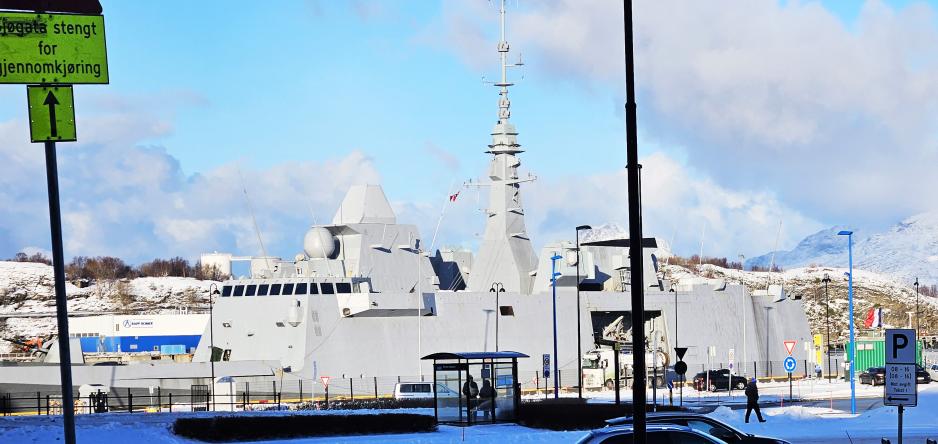Arne O. Holm says The Defense Analysis 2025: We Can No Longer Assume That the US Is Our Most Important Ally

The view from my living room window illustrates how dependent the High North is on NATO. Yesterday morning, a French navy vessel was docked in the Port of Bodø. (Photo: Arne O. Holm)
Comment: Lately, we have been bombarded by security policy analyses. They all share some common traits, though. One is that Donald Trump has changed the security policy situation faster than the ink can dry on the pages of the reports. Most recently, it is the Norwegian Defence Research Establishment (FFI) that struggles to keep up with the US chaos pilot.
This is a comment written by a member of the editorial staff. The comment expresses the author's opinions.
Naturally, it is impossible to be up to date with the development in reports that take years to make. The recent security conference in München and the so-called peace talks in Saudi Arabia illustrate this problem.
In defense of the FFI, they do consider the uncertainty linked to the US role in the international war arena.
In black and white
In a separate table, FFI lists what it calls "prerequisites that could fail." One is the assumption that "the US is Norway's most important ally." The FFI lays this out in black and white: "The political development in the US creates greater uncertainty regarding this prerequisite."
To provide the possibly failing assumption with an extra twist, the FFI adds that increased tension in the Indo-Pacific region is taking up more of the US's capacities.
To put it mildly, this is an essential and perhaps striking realization from the FFI. On the daily, dependence on the US is one of the pillars of the High North's defense. Norway has placed its fate in the hands of the US both through NATO and bilateral agreements.
Impossible to keep up with the US chaos pilot.
The gravity is also emphasized when the FFI states that we must be prepared for all kinds of threats from Russia, including militarily.
"This entails being ready for a high-intensity battle against Russian strengths in the North," states the report, concluding that we are not currently prepared for this.
Evacuation
The report particularly highlights a previously under-communicated part of the total defense. According to the report, we lack updated plans to evacuate the civilian population in Eastern Finnmark. This will have consequences for "the real freedom of action to use Norwegian forces with the greatest military effect in a specific situation."
If war breaks out, a dilemma could arise between the state's need for military control versus the population's need for protection, states the report, which leaves no doubt that this dilemma concerns the High North.
The challenge, which in this context is far too weak an expression, is amplified by the Armed Forces' struggle to provide personnel for the most vulnerable areas in the North. In the FFI report, succeeding in the necessary recruitment becomes a "risk of failure."
Calling it a challenge is a far too weak description.
Russia's full-scale war against Ukraine has lasted for three years. Three years of suffering, but also three years in which weaknesses in Norway and NATO's defense ability continue to be revealed and publicized.
Worries, not scared
The Norwegian Chief of Defense, Eirik Kristoffersen, kicked off the news stream yesterday morning by telling the Norwegian people there is reason to worry but not to be scared. He still places his trust in NATO, a NATO that also includes the US.
The report from the Norwegian Armed Forces' research institute states that that assumption cannot be taken for granted.
The Armed Forces' long-term planning must also consider the American threat.
Not just the Russian.



